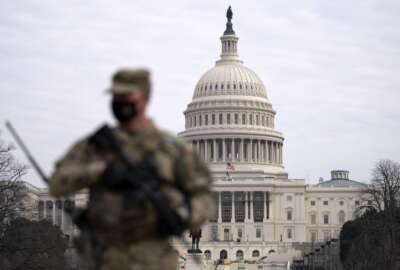National Guard gets a new chief after months-long leadership gap
Lt. Gen. Steven Nordhaus, who will be promoted to a four-star general, inherits the National Guard as its workforce and resources are being stretched thin.
The National Guard has a new chief following a nearly two-months leadership lapse.
The Senate on Tuesday confirmed Lt. Gen. Steven Nordhaus as the National Guard Bureau chief by a voice vote. Nordhaus, who will be promoted to a four-star general, inherits the Guard top position from Gen. Daniel Hokanson, who retired from federal service in August.
The White House nominated Nordhaus to become the next chief right before members of Congress went home for a six-week summer recess, causing frustration among lawmakers and advocate groups that the White House didn’t pick the successor sooner to prevent this leadership gap. Lt. Gen. Jonathan Stubbs, who was confirmed as the director of the Army National Guard in July, has been serving as the Guard acting chief.
Nordhaus, who has served as the North American Aerospace Defense Command commander, takes over the National Guard as its workforce and resources are being stretched thin due to recruitment challenges, increased domestic responsibilities such as disaster response and border support, while also working to modernize the force for future missions. The National Guard also has a history of being called upon to assist with non-military tasks.
In his testimony submitted to the Senate Armed Services Committee, Nordhaus said recruiting and retention, readiness and modernization of the force will be the three most significant challenges during his time as the Guard chief.
In June, when Hokanson testified before the Senate Appropriations Committee, he said sending Guardsmen to the U.S.-Mexico border adds “no military training value for what we do.”
During his nomination hearing earlier this month, Nordhaus echoed the sentiment, saying, “The border mission does not add readiness value. Like any mission or deployment, it does take our service members away from their families.”
As for the potential impact of National Guard deployments to the U.S. border on overall military readiness, Nordhaus said he will conduct a readiness assessment and share those findings with Defense Department senior leaders and Congress.
Along with Nordhaus’s confirmation, the Senate has approved nearly two dozen general and flag officer promotions in pre-election deck clearing. Lawmakers are set to leave town Wednesday after clearing a funding bill to avert a government shutdown and they won’t return until after the presidential election.
Lawmakers also confirmed Vice. Adm. Alvin Holsey to lead the U.S. Southern Command, Lt. Gen. Randall Reed to lead the U.S. Transportation Command, Lt. Gen. Xavier Brunson to serve as commander of U.S. Forces Korea.
Lt. Gen. Ronald Clark’s promotion to lead Army forces in the Pacific was also cleared after Sen. Tommy Tuberville (R-Ala.) placed a hold on his nomination earlier this month citing concerns surrounding Clark’s actions during Defense Secretary Lloyd Austin’s hospitalization in January.
Earlier this month, Maj. Gen. Pat Ryder told reporters Clark, who has served as Austin’s top aid, is “exactly the kind of leader [the Defense Department] needs.” Last year, Tuberville held up hundreds of military and civilian promotions for nearly ten months as a protest to the Pentagon’s abortion policy.
While the National Guard now has a new chief, leadership lapses still persist — Maj. Gen. Duke Pirak’s nomination, who has been tapped to lead the Air National Guard, is still in limbo, awaiting Senate confirmation.
Copyright © 2025 Federal News Network. All rights reserved. This website is not intended for users located within the European Economic Area.




